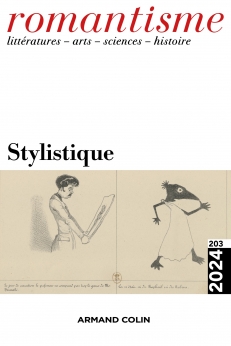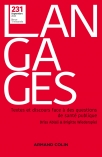
ROMANTISME N°203 (1/2024)
Pour acheter ce numéro, contactez-nous
Recevez les numéros de l'année en cours et accédez à l'intégralité des articles en ligne.
En face du « style », de la « structure » ou de « l’écriture », l’ensemble des catégories concurrentes qui ont servi à penser le phénomène littéraire, la manière fait figure de demi-concept ou de non-concept. Alors qu’elle a constitué à l’âge classique un terme global, incluant la philosophie politique, la morale, la religion, les arts et la littérature, elle n’apparaît plus au XIXe siècle qu’au rang d’une variante du style qui tend à en effacer la spécificité. En vérité, la manière hante aussi bien la Théorie de la démarche de Balzac que la sociologie d’Émile Durkheim. Elle représente plus encore un contre-concept, de nature à la fois artistique et anthropologique, relevant d’une autre tradition épistémologique. Existe au XIXe siècle ce que Baudelaire appelait un « parti pris de la manière », marqué par la promotion de l’empiricité et de la subjectivité ainsi que le développement d’une poétique de la malfaçon, sensible de Hugo à Lautréamont ou Corbière.
Opposite “style”, “structure” or “écriture (writing)”, the sum of the categories that have been used to think the literary phenomenon, manner appears as a half-concept or a non-concept. Whereas the term was, in the Classical Age, global, including political philosophy, morality, religion, arts and literature, it is no longer used in the 19th century except as a marker for a variant of style, which tends to erase its specificity. But in truth, manner haunts Balzac’s Théorie de la démarche (A Theory of Walking) just as much as Émile Durkheim’s sociology. Yet more, it represents a counter-concept, whose nature is both artistic and anthropological, and answers to a different epistemological tradition. There is in the 19th century something Baudelaire called a “parti pris de la manière”, “preference for manner”, characterised by the promotion of empiricism and subjectivity as well as the development of a poetics of the defective, perceptible from Hugo to Lautréamont or Corbière.

